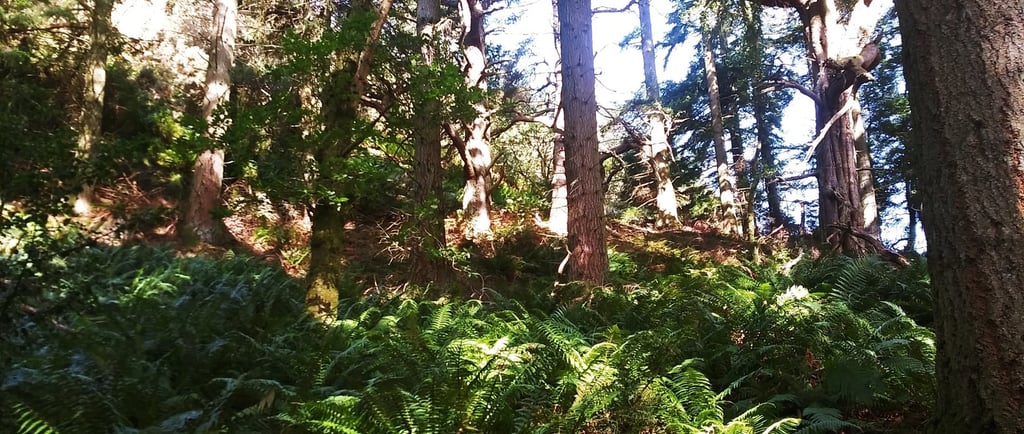What I’ve Learned from Nature, The Patient Teacher
Observing nature has taught me more than school ever could
PHILOSOPHYOBSERVATIONWELL-BEINGNATURELEARNINGPEACE
Heidi Hahe
3/25/20254 min read


As a spiritually sensitive child, I spend a lot of my much younger years afraid of the outside. I could sense and feel the spirits of the past that had dwelled on my parents’ land and it frightened me to the point that I didn’t like to be outside by myself. It got better as I got older, thankfully, and I eventually became a runner and I spent a lot more time outside.
But it took me into my 30’s to really have a true love and respect for nature. Being in nature rejuvenates me in a way that nothing else can; exchanging energy with Gaia herself is the best preventative medicine you could ask for.
What I love most about nature are the lessons I have learned from it, simply through observation. It is beyond my comprehension how a person, who called themselves a scientist, could spend time observing nature and come away with the idea that competition is its primary characteristic. I couldn’t disagree more.
Take a forest, for example; a healthy forest is teaming with biodiversity in a symbiotic, supportive system. Trees that require the light of the sun to flourish will grow tall and provide shade for plants beneath them that require shade. Mushrooms, which help in the decay process of fallen trees, exhale the carbon dioxide which the trees above them inhale. The mushrooms, in turn, inhale the oxygen that the trees exhale.
The root networks under the soil are vast and interconnected, not choking each other for water and necessary nutrients. In fact, they work together to ensure that all trees in their network have the proper nutrition. Along river beds, this network of rooting will deter soil erosion into the water.
How could anyone see this and think that nature is punctuated by competition? Even within the animal kingdom, where our nomenclature is dominated by names for groups of fauna! But then, it is true that one can only see from their own, colored perspective, based on their ideologies and experiences.
Not only do I see synergistic symbiosis when I spend time with nature, but I come away with the validation of an assurance I grew up with: consider the lilies; they do not toil and strain. As I stood on the side of the walking path around the lake that I used to live next to, shamelessly staring at the wildflowers, the sincere importance of that verse finally occurred to me.
I considered the lilies, as instructed, and I understood why it was so important that they do not toil; they are rooted to the ground and so they must, by virtue of their being, trust that everything that they need will come to them. The same is true for a tree. This may seem obvious, but I mention it for a reason. Consider not just a lily, consider, for a moment, a Redwood. Redwood trees are truly ancient, thousands of years old. Rooted to one spot for thousands of years, getting everything they need to survive throughout the millennia.
It’s wu-wei, from Taoism. The idea that if [a human] does nothing, then everything will still be accomplished. Nature does not need human intervention in order to grow and thrive and change; it will happen on its own.
As someone who is on a journey of trusting myself and the universe to provide me with what I need when I need it, this realization was incredibly poignant.
A more recent realization is that, not only is cooperation the true characteristic of nature, but so is diversity. As I walked around yet another path next to running water (thank you, universe!), in a field of desert wildflowers, I stopped my bare feet and let my eyes roam over the immense biodiversity that surrounded me. There were tall mullein herbs and thistle and cactuses and black eyed susans and other yellow and purple flowers I can’t name with grasses of many kinds.
All of these plants lived together effortlessly and this biodiversity happened organically along this stream bed with the help of birds and insects and the wind. It made me realize in a much deeper way that homogeneity is unnatural and, therefore, forced. I already understood that diversity was healthy and would happen naturally if allowed, but I hadn’t realized how well this idea is epitomized in the natural world. Living together in harmony and sharing resources is the nature of nature and it's written plainly everywhere one looks.
The tree is the mightiest of the kingdom plantae and so its lessons are vast ; one day, as I sat and simply studied a tree, something struck me deeply; a tree will continue to grow until it dies. Every year a tree gains a new ring, whether it wants to or not. Every Spring, new buds of new branches begin to sprout from the old and new leaves and flowers and fruits will grow. There is not a single year that goes by in the life of a tree in which it does not grow or change, even in a subtle way.
What if humans worked in the same way? Of course, we are free will beings and so we can choose to have an entire lifetime where we do not grow at all. Multiple lifetimes, even. But what if we chose to take from the wisdom of a tree, to utilize their experience to improve our own? What if we all chose to grow every day, every year; to be the same tree while simultaneously being different, larger, fuller.
What if, instead of allowing our experiences to wilt us, we used them to make our trunks that much stronger? A twisted, gnarled tree, which has obviously grown in a harsh or windy environment, can withstand more wind and more adversity than the tree that grows straight and tall in a more temperate climate. It is the tall, straight trees that fall on houses when the wind picks up.
Nature is the most patient teacher, truly embodying the idea of throwing the seeds without controlling where they fall, as Jesus instructed his followers to do. It does not and will not force its philosophy on the observer, but silently offers it up for consideration, tenacious in its patience and love.
I long for a world where humans chose to live in the same manner.
